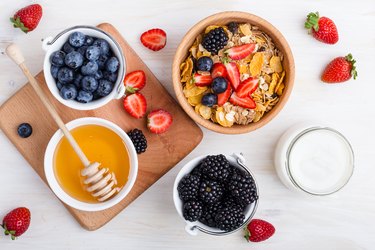
With its various bright hues and sweet and sour flavors, fresh fruit is like nature's candy. If you're watching your weight or just trying to eat healthier, eating fruit after a meal instead of sugary desserts can save you calories and up your nutrient intake for the day.
Tip
Eating fruit after a meal isn't bad for you. On the contrary, eating fruit instead of sugary desserts can improve your health.
Video of the Day
Fruit After a Meal Myths
There are a lot of myths out there about when you should and shouldn't eat certain types of food. One of those is that, when eaten after a meal, fruit loses some of its nutritional value, or that your body somehow doesn't absorb all the nutrients. Another is that when fruit mixes with the food you've just consumed and with digestive juices, the combined mass begins to rot.
Video of the Day
Neither of these rumors is true, says the Produce for Better Health Foundation. The misinformation probably comes from traditional Indian dietary principles that say certain foods shouldn't be mixed. But there's no modern scientific evidence that supports this theory.
The only reasons eating fruit post-meal may be contraindicated are purely individual. For example, if you suffer from heartburn and you eat citrus fruits after dinner, it could trigger acid reflux, especially if you go to bed soon after. Lying down exacerbates acid backup, reports the Mayo Clinic, which is one of the disadvantages of eating fruits at night for some people.
Read more: 5 Tricky Fruits and How to Eat Them
Fruits After Food
The most important thing diet-wise when it comes to eating fresh fruit (and vegetables) is to have several servings a day. Fruits provide fiber, vitamins, minerals and antioxidants that are crucial for good health. Dietary fiber not only normalizes digestion and prevents diseases of the colon, but it also increases the satiety factor of your meal without increasing the calorie count.
Dietary fiber swells when it comes into contact with fluids in your digestive system, which causes gastric distension. Besides making you feel full, this sends signals to your brain that inhibit the release of an appetite-stimulating hormone called ghrelin, according to a research review in the Journal of Nutrition and Metabolism in January 2019.
Fiber also helps control blood sugar. Although fruit can be high in natural sugars, the fiber packaged along with it helps to slow sugar's absorption into your bloodstream, preventing blood sugar spikes. You can't say that about a piece of chocolate cake.
Chocolate cake also doesn't contain the volume of vitamins and minerals found in fruits. Citrus foods are a rich source of vitamin C, which you need to build collagen, the protein that provides your body's structure and aids wound healing. Watermelon, mango, cantaloupe and grapefruit are good sources of vitamin A, which supports the health of your skin and eyes. Kiwis, cherries and tomatoes are rich in potassium, an electrolyte mineral that helps regulate blood pressure.
Finally, all fruits, but especially red and purple fruits such as blueberries, raspberries and blackberries, contain plant chemicals with antioxidant and anti-inflammatory properties. "Oxidants" or free radicals, are unpaired electrons formed both by natural physiological processes and by exposure to environmental contaminants. Oxidants can attack healthy cells and cause diseases, such as cancer. As the name implies, antioxidants can help neutralize free radicals and prevent cell damage.
Read more: Top 10 Healthiest Fruits & Vegetables
Eating Fruit After a Meal
Fruit makes for an almost guilt-free post-meal treat, as long as you consume it in moderation. Although bananas are nutritious, they are also high in sugar and calories relative to some other fruits, according to USDA data.
Eating too many bananas could increase your calorie intake and potentially lead to weight gain if your intake exceeds your calorie expenditure. However, to be fair, bananas are a lot less likely to cause problems than a Boston cream pie.
Think fruit could never take the place of your favorite sweet treat? Give it a chance. Your sweet tooth may be conditioned to the unnatural sweetness of your favorite sugary desserts. But if you allow some time, your tastebuds can become more sensitive to fruit's natural sweetness.
While a whole apple or a cup of berries can be delicious on their own, you can combine them with other foods that can make them feel like more of a treat. For example, make a parfait with plain low-fat Greek yogurt, blueberries, blackberries and raspberries. Sprinkle some granola or dark chocolate shavings over top and enjoy.
You can also make frozen fruit "ice cream." Blend some already frozen banana chunks and frozen berries in your blender until smooth and scoop into a bowl. Top with coconut, crushed nuts or dark chocolate shavings.
- Produce for Better Health Foundation: "About The Buzz: You Should Eat Fruit on An Empty Stomach?"
- Mayo Clinic: "Heartburn"
- Mayo Clinic: "Dietary Fiber: Essential for a Healthy Diet"
- Produce for Better Health Foundation: "Key Nutrients in Fruits & Vegetables"
- AARP: "Purple Reign"
- Colorado State University: "Free Radicals and Reactive Oxygen"
- USDA FoodData Central: "Bananas, Raw"